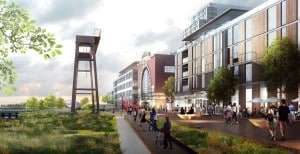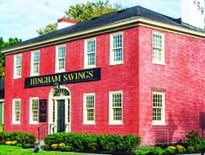
Opponents of the Edison project are concerned it could impinge on busy truck traffic entering and leaving Boston’s only container port.
If this is the Conservation Law Foundation’s best shot, its chances of halting plans for a massive new condominium and hotel complex on South Boston’s waterfront aren’t looking too good.
In fact, Redgate Capital has far more reason to be worried about the intense opposition in South Boston to the project – with a pair of city councilors pushing for a halt – than CLF’s clumsy attempt to tar the developer with charges of shady behavior.
The environmental nonprofit, which has been ramping up efforts to block new development on Boston’s waterfront, has lobbed conflict of interest charges at Redgate, the co-developer pushing plans to transform the site of a dirty, old Southie power plant into a 1.9-million-square-foot project featuring more than 1,300 condos and apartments, two hotels, retail space and offices.
Redgate’s big offense? The firm once did consulting work for Massport, the public authority that owns the nearby Conley Container Terminal.
CLF’s Objections Appear Thin
Part of Massport’s job is to protect the interests of the city’s remaining ports and docks from encroachment, with residential development seen as a threat to remaining vestiges like the Conley Terminal, billed as the only full-service shipping container complex in New England. After all, once condo owners start moving in they might not be so happy with all the truck traffic in and out of the Conley Terminal – including an access road to the terminal Massport added a few years ago right in front of the power plant site – or so the argument goes.
As the joint developer of the Edison redevelopment proposal, Redgate’s interests are now, in theory, the opposite of their former employer’s and hinge on Massport giving the project some slack so plans for new hotels, condos, apartments and offices can go forward.
Now it would certainly be a conflict – for Redgate and for Massport – if Redgate was currently doing work for the port authority. But there a little problem here: Redgate stopped working for Massport five years ago, in 2014.
Wondering what the issue is? You’re not alone.
It’s never a good sign when a charge of improper or unethical behavior leaves you scratching your head and trying to understand just what is being alleged and, frankly, what exactly the story is. It’s certainly not good for the group making the charge, in this case, a respected organization like CLF.
In a letter to Massport expressing his group’s concerns, CLF President Brad Campbell questioned why Redgate and its project partner, Hillco Redevelopment Partners of Illinois, have been able to push the project through the city and state planning process under the seeming assumption that Massport would drop deed restrictions banning residential housing at the old power plant site.
In other words, Campbell is asking whether the public authority might have a too-cozy relationship with Redgate, whose well-connected principals like Ralph Cox and Kyle Warwick have helped guide some of the biggest projects in the Boston area through the city and state approval process over the past few decades.

Redgate Capital and Hilco Redevelopment Partners have proposed a 1.9 million-square-foot mix of condominiums, apartments, hotels and retail space on the site of an old power plant in South Boston. Courtesy Spagnolo Gisness & Assoc.
Redgate’s Insider Ties Likely Stronger
Bristling, Massport has argued, not very convincingly, that it has not lifted a finger to jettison the deed restrictions and has even voiced concerns over residential parts of the proposed project that it felt were too close to the Conley Terminal.
While technically correct, the idea that Massport would sit on its hands as the massive redevelopment project chugs through the city and state approval process, only to pull the plug at the last minute, stretches credulity.
Reading between the lines, the port authority has effectively given either a green or a yellow light to Redgate’s plans to build housing at the Edison site.
The only question is where on the site the condos will be built. It’s a question that provides political cover for Massport, which can claim it raised objections to the housing while still letting it move forward.
There is one tiny problem if CLF thinks it will sink the project: Cozy, insider relationships between developers, property owners and state agencies are par for the course in Boston.
There have been at least three former Boston City Hall planning chiefs who, after overseeing the approval process for new luxury condo towers and myriad other projects, left to become developers themselves.
Just take Tom O’Brien, a one-time director of the now Boston Planning and Development Agency. After a short stint at City Hall in the late 1990s, O’Brien is now one of the most influential builders in Greater Boston, with major projects underway at Government Center and Cambridge Crossing and plans in the works for Suffolk Downs in East Boston.
Then there’s Joe Fallon, the man behind the Seaport’s Fan Pier. While he never headed the city’s planning operations, it certainly didn’t hurt he was friends at the time with the late Tom Menino, the city’s longest serving mayor.
Another Menino favorite, Millennium Partners’ Anthony Pangaro, has developed two major luxury condo towers on Washington Street and, under Mayor Marty Walsh, is gearing up to build a third where the old Winthrop Square parking garage once stood in the Financial District.
Fewer Insider Deals Would Benefit Boston
Undoubtedly, Redgate and its high-powered principals likely have their own connections at Massport as it pushes plans forward on its contentious proposal to redevelop the old Edison site.
Moreover, it’s hard to imagine that Greg Bialecki, a Redgate principal who once service as cabinet secretary for the state’s Executive Office of Housing and Economic Development, didn’t get to know a few people at Massport during his time in office.
Boston and Massachusetts as a whole would probably be better off if major development projects were not the product of such insidious insider wheeling and dealing.
But it’s hard to see how CLF is going to be able to stop the Edison redevelopment with toothless accusations like the one it leveled against Redgate.
Scott Van Voorhis is Banker & Tradesman’s columnist; opinions expressed are his own. He may be reached at sbvanvoorhis@hotmail.com.






